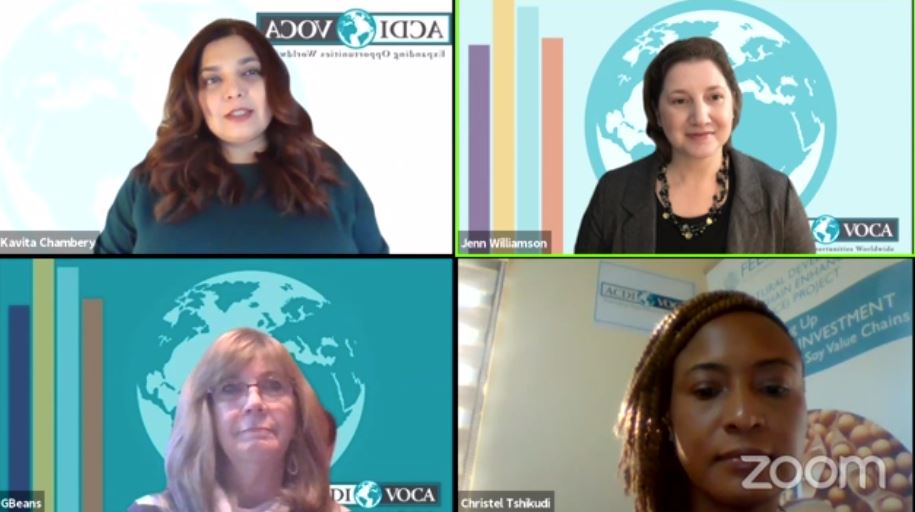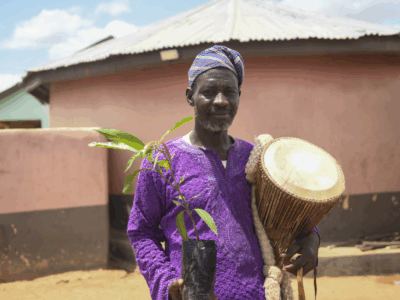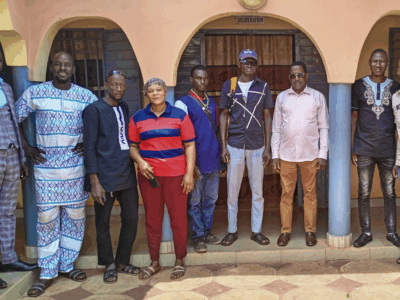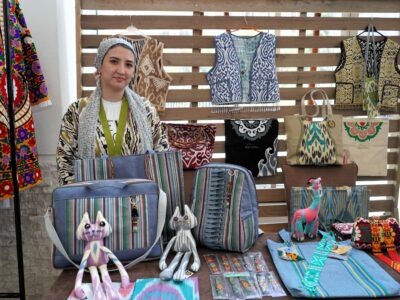
The landscape of global development is changing. Today, women who work for international NGOs are a majority in nearly 42 percent of senior management teams, according to a FAIR SHARE report. More women are also rising to the role of chief of party (COP) to lead the implementation of development programs around the world.
What does it take for women to succeed as COPs, and how can organizations support them as they develop their careers? During a virtual session at the 2020 Women in Global Development Leadership Forum — the largest conference of its kind in the industry hosted by the Women Innovators & Leaders Network— three ACDI/VOCA staff shared their advice for rising female leaders.
1. How Did You Become a COP?
Panelists Georgia Sheehy-Beans, a former chief of party in Sierra Leone, and Christel Tshikudi, a current chief of party in Ghana, both came into the role in a roundabout way. Georgia worked in the global development sector for years as a U.S.-based project manager but made the choice to divert her career path and become a grants manager — not because it was an advancement but because it was a step closer to her goal of working overseas.
Christel started her career in Switzerland working in business development in the private sector. She managed an NGO with her mother to support women in her native Democratic Republic of Congo and later moved to the U.S. to pursue an MBA. She worked at several organizations’ home offices for years before becoming a regional operations manager in West Africa.
2. What Qualities Do Women Bring to the COP Role That Make Them Successful?
Panelist Kavita Chambery is a senior director based in ACDI/VOCA’s Washington, D.C., office who oversees a portfolio of projects in East Africa. When asked what qualities make women successful leaders, she said that listening, being inclusive, and other soft skills are areas where women excel and where leaders become truly effective.
Georgia added that female leaders often are communicative and collaborative, two skills that are crucial to problem solving. “[As a COP,] often you are coming into an environment where you are an outsider; you are a guest,” Georgia said. “My feeling as a COP was that I was a facilitator. I had a work plan and a budget and targets to reach, but I couldn’t do that without the team, and I wanted to respect that as well as the technical knowledge that the team had. They know how things work in the country, and they know who the important people are to get buy in from.”
3. What Advice Would You Give to Other Women Seeking Leadership Roles?
Visibility is key. Before becoming a COP in Ghana, Christel sought out senior managers who would advocate for her. “Make yourself visible and seek and forge a pathway as quickly as possible,” she said. Christel also sought opportunities to diversify her skills. For years, she held operational positions but knew she needed technical skills to work overseas. She stretched her core role into new areas to slowly build her technical expertise.
In addition to this, Christel encouraged rising female leaders to take failures and negative feedback on the chin. “Sometimes we shy away from leadership roles for fear of not living up to expectations. A fear of failure is an obstacle,” she said.
One of the best ways to prepare may be learning the ins and outs of the organization’s procedures. “When you reach the field as a COP, you’ve arrived but you really haven’t,” Georgia said. “You still need to reach out for help, and you still need the support of your headquarters.”
What about women in their 20s who may have just landed their first job and have a desire to work overseas? Kavita said that for those who “want to be where the rubber hits the road” the first step is to master the basics. “When you do core job well, that builds trust and confidence [with managers],” she said.
Kavita also noted that transferable skills can be gained at home offices. For example, contributing to a proposal means coordinating with multiple departments and stakeholders. This builds transferable skillsets that also apply to how country program offices operate.
4. What Recommendations Would You Make to Ensure Diversity in Leadership?
Some donors may assume that men will fill the roles of COPs because they meet the high criteria of having decades of experience. “It is a vicious cycle for women trying to gain that experience,” Christel said. But Christel insisted that the cycle can be broken by changing perceptions around how to define that experience. “I wouldn’t say 15 or 20 years of management experience is needed,” she said. “When you have proved your skills, even outside of development, they come into play.”
Years of experience are not all it takes to do the job. Kavita called for getting the word out about qualified female candidates. “As USAID talks about integrating gender in projects, it’s a good time for the donor to look at that,” she said.
5. What Can Be Done to Promote Local Women for the Role of COP?
Some programs arrange with the donor to intentionally transition from a foreign national COP to a local COP after the first year or two of implementation. However, when that arrangement doesn’t exist, COPs can still leverage their influence with the donor to make a transition happen.
“If you’re a COP in that role and see [local] talent, think about positioning that person in front of the donor,” Kavita said. “It’s about giving up some of your power in that role to let someone else shine. It requires a plan. It requires active intention and engagement between you and your company.”
Today, many donors, including USAID through its Journey to Self-Reliance framework, are moving toward empowering national staff to lead programs.
What other questions or advice for rising female leaders do you have? Please comment below.
About the Panelists
Georgia Beans is a vice president of quality and compliance at ACDI/VOCA. She served as chief of party for an ACDI/VOCA-implemented program in Sierra Leone. Prior to joining ACDI/VOCA, she served as a country director in Tanzania and Cambodia. Since launching her career in global development in 1991, Georgia has seen many changes in the international community that are positive for women’s pathways to leadership.
Kavita Chambery is a senior director at ACDI/VOCA who oversees a portfolio of projects in East Africa. She has worked in global development for more than 15 years, beginning her career at Chemonics International and later at DAI. She has been with ACDI/VOCA for more than seven years.
Christel Tshikudi is chief of party of the Feed the Future Ghana Agricultural Development and Value Chain Enhancement II (ADVANCE II) Project, funded by USAID and implemented by ACDI/VOCA. Previously, she served as a senior director of inclusive market systems at ACDI/VOCA’s home office in Washington, D.C. Christel also served as a deputy program director in Zambia and regional operations manager in West Africa for ACDI/VOCA.
The session was facilitated by Jenn Williamson, managing director of gender and social inclusion at ACDI/VOCA.








